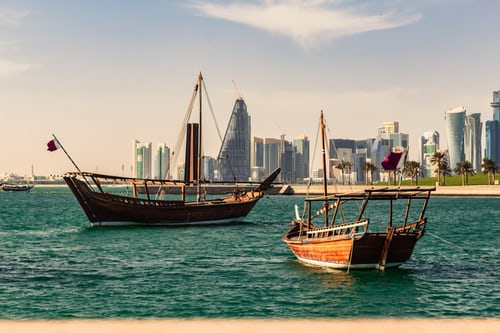Living in Qatar
Travel and Transport
Doha International Airport is Qatar’s commercial air link and receives all international flights. There are no vaccinations legally required to travel to Qatar and visitors 80 countries, including most European and American countries, can apply for a tourist visa upon arrival.
Public transport includes a metro, tram and bus network. Private cars remain the most popular form of transportation, followed by taxi, limousine services and car booking apps
Food and Drink
Hospitality is ingrained in Qatari culture, and food and drink play an important role. Commonly, dates and Arabic coffee are presented to guests as part of local hospitality. Import of pork products is illegal in Qatar and Muslims must consume meat slaughtered in accordance with Islamic law, which is referred to as ‘Halaal’. Alcohol is served in 5 star hotels to expatriates and can be available for consumption at home after getting an alcohol permit.
Dress
In accordance with Islamic law, Qatari women typically cover their heads with a scarf known as a ‘hijab’. In public they may also wear the ‘abaya’ a long black robe work over the woman’s clothes; and in some case women choose to wear a think black veil, which leaves only the eyes showing. Most Qatari men wear a ‘thobe’, a white, tunic-like garment reaching to the ankles, with a headdress called a ‘ghutra’.
Western dress is widely accepted and is in fact the norm in Qatar for the majority of people. However, it is recommended to dress with modesty.
Living in Qatar for Women
Initiatives driven by His Highness Sheikh Hamad bin Khalifa Al-Thani, the Father Emir and Sheikha Moza bint Nasser have ensured that women are granted full rights, including voting, driving and working rights. Qatar Labor Law states that women should have equal pay, training and promotion opportunities for similar duties.
Many Muslim women choose to wear hijabs. Out of respect for the culture it is recommended that women cover their shoulders and do not wear short shorts or dresses above the knee or wear transparent fabrics. Qatar is an Islamic society and many women choose to live in this tradition. Overall, there is widespread respect and appreciation for ethnic, religious and cultural differences.
Entertainment and Leisure
There is a widespread variety of entertainment options in Qatar, for adults and children alike. The mild climate makes outdoor leisure activities very popular – from day trips to the mangrove swamps on Qatar’s north shore to enjoying one of Qatar’s many white sand beaches. For those interested in indoor activities there are entertainment parks, shopping centers and cinema complexes. Qatar also caters for those interested in nightlife with numerous bars, restaurants and nightclubs. Many international brands are available in the malls, creating a home away from home for the large expatriate community.
The Qatar Philharmonic Orchestra, Katara Cultural Village, The Pearl and the annual Doha Tribeca Film Festival are just a few of Qatar’s cultural attractions.
Sport is consider an important national and social activity in Qatar, with facilities for all types of sports, including tennis, golf, water sports, horse racing, and falconry.
International Sporting Events
Qatar hosts many international sporting events throughout the year including the ATP tennis tour, the annual Qatar Masters Golf tournment, and the Qatar Marathon, it has previously hosted the Asian Olympic Games and Asian Football Confederations’ Asian Cup and the IAAF World Athletics Championship in 2019. The country is now gearing up for the FIFA World Cup in 2022.
Art and Architecture
Qatar features a dynamic and active art scene. Local and International artists work is displayed throughout the country in art galleries and public spaces. Qatar’s world famous Museum of Islamic Art, designed by renowned architect I.M. Pei, opened in 2008 and houses an impressive collection of Islamic Artifacts and Arabic Art.
Working and Business
Approximately 12% of the population are estimated to be Qatari nationals, suggesting that as much as 88% of the population are expatriates. English is the language most commonly used in business. The standard working week runs from Sunday to Thursday, working hours vary depending on the organization, but core hours are 7:30 – 15:30.
SOURCE: https://www.sidra.org/healthcare-professionals/career-opportunities/living-in-doha/

